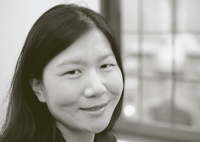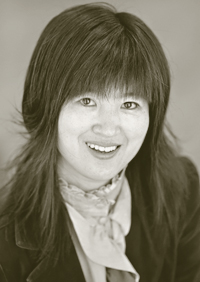Fellows Focus Eastward
Soo Ah Kwon
Department of International and Transcultural Studies
As a graduate student at U.C. Berkeley, Soo Ah Kwon worked as a liaison for the Asian and Pacific Islander community in an
"Asian-American scholars talk about how Asian Americans are an apolitical minority, devoid of any political agency," says Kwon, now a TC Minority Postdoctoral Fellow established in the College's Anthropology program. Yet the
Kwon, who helped the group organize itself, wrote about her experiences in a four-year ethnographic study that eventually became her dissertation.
"Numerous studies in education sociology talk about young people's adaptation path-'"language retention, how they do in school," she says, "but nothing looks at their political participation."
Traditionally, schools have performed the work of educating foreign-born students for citizenship, but Kwon-'"who is continuing her research with youth groups in the Bronx and
"I am talking about working class young kids trying to change social aspects of life and community," says Kwon, who after leaving TC will become an Assistant Professor of Asian American Studies and Human and Community Development at the University of Illinois, Urbana-Champaign. "Many adults don't even know city council members the way these kids do."
Desiree Gin
Department of Human Development
What lies behind the stereotype of the overachieving Asian student? Desiree Chin first began pondering that question when she was working as an English teacher in
One young man, in particular, wore a sad expression whenever he came to class. He had few friends and rarely interacted with other students. Qin later found out that his father had recently passed away.
At the time, students in
Qin left
In a postdoctoral program at
"We are so familiar with how well Asian students are doing," she says. "Educationally, they might be doing well on the aggregate level, but what is happening with their relationships with peers and teachers at school, and with their relationships with their parents? What is happening with their psychological adjustment? In fact, Asian girls between the ages of 15 and 24 have the highest rate of depression and suicide in comparison to other ethnic groups in this country."
As a Minority Postdoctoral Fellow at Teachers College, Qin, based in the Department of Human Development, has begun developing a study that will look at the psychological adjustment of high achieving Asian-American students in a highly competitive
Published Thursday, Nov. 10, 2005

